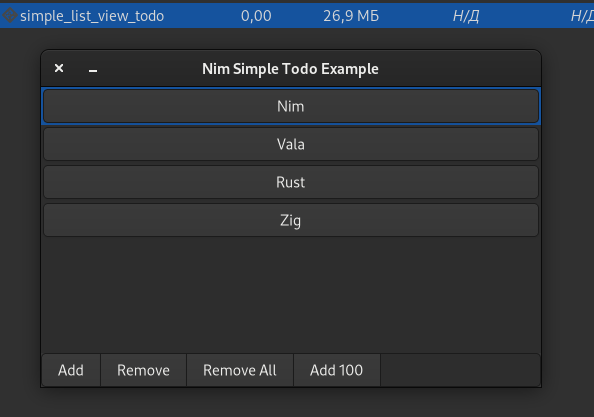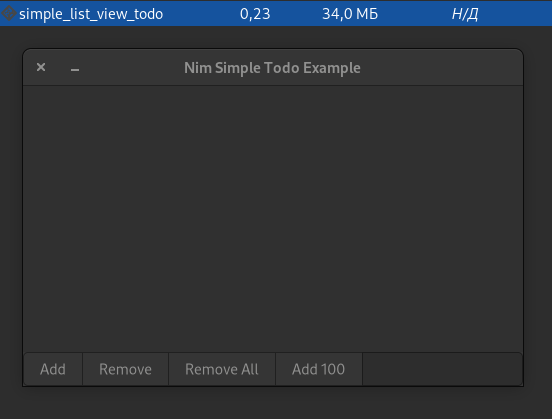-
Notifications
You must be signed in to change notification settings - Fork 20
New issue
Have a question about this project? Sign up for a free GitHub account to open an issue and contact its maintainers and the community.
By clicking “Sign up for GitHub”, you agree to our terms of service and privacy statement. We’ll occasionally send you account related emails.
Already on GitHub? Sign in to your account
How correctly free memory from SignalListItemFactory in teardown_cb #145
Comments
|
Thanks for reporting. Indeed listitem.setChild(nil) is the correct way. But I have to admit that I have never really debugged memory leaks in GTK. It is difficult, as GTK leaks itself in some way. When we compile and run GTK C examples with valgrind we get reported leaks and other issues. I asked on the GTK forum some years ago about that, the suggested solution was difficult, so I never tried. But I generally check that destructors are called. Will investigate it soon. |
|
Are you sure your observed leak is a bindings issue? I can not discover Nim code that may generate it. And using valgrind reports many OpenGL related allocations. So we would have to first convert your Nim code to plain C and see if that is really leak free. Your linked c code example seems to be not identical in behaviour to your Nim example. |
|
Not sure, need ask on gtk discourse. |
|
Actually I can not confirm a serious memory leak. Compile your code above with Run executable with /usr/bin/time -v ./t When we immediately terminate the program we get: Maximum resident set size (kbytes): 61996 When we play a bit with it including clicking "add100" we get Maximum resident set size (kbytes): 68396 When we play more with it, using "add100" multiple times but finally clear the list we get Maximum resident set size (kbytes): 67628 So no increase. Of course 68 MB peak size for such a tiny program is a lot. And valgrind reports leaks, but valgrind does that for all GTK programs for me, for plain C ones too. GTK is internally not really free of tiny leaks. I asked once Mr Bassi, they call it intern allocations which can not be freed. To investigate that in detail one would need valgrind white lists, I was told... If you still think that we have a serious leak give us detailed instructions how you compiled your program, with which compiler version and which C backend, and how you measured the leak. Note that we used -d:useMalloc for our tests, as without it the Nim memory system may reserve buffers and do not return all to the OS. |
Yea, leaks in this tiny example are very small. |
|
Example with inherited items import gintro/[gtk4, gobject, gio]
import std/with
type
AddControlData = tuple
entry: Entry
list: StringList
DeleteControlData = tuple
selection: SingleSelection
list: StringList
MyBox = ref object of Box
btn1: Button
btn2: Button
data: string
### Utils
func getNItems(self: StringList): int =
let lm = cast[ListModel](self)
return lm.getNItems()
proc getString(self: ListItem): string =
let strobj = cast[StringObject](self.getItem())
result = gtk4.getString(strobj)
func generate100Strings(itemNum: int): seq[string] =
for index in itemNum..itemNum + 100:
result.add "item №" & $index
### SignalFactory callbacks
proc setup_cb(factory: gtk4.SignalListItemFactory, listitem: gtk4.ListItem) =
let x = newBox(MyBox, Orientation.horizontal, 0)
x.setCssClasses("linked")
x.btn1 = newButton("")
x.btn2 = newButton("")
x.append x.btn1
x.append x.btn2
x.data = "qweqweqweqweqweqweqweqweqweqweqweqweqweqweqweqweqweqweqweqweqwe"
listitem.setChild(x)
proc bind_cb(factory: gtk4.SignalListItemFactory, listitem: gtk4.ListItem) =
let
data = listitem.getString()
myBox = listitem.getChild().MyBox
myBox.btn1.label = data
myBox.btn2.label = data
proc unbind_cb(factory: gtk4.SignalListItemFactory, listitem: gtk4.ListItem) =
discard
proc teardown_cb(factory: gtk4.SignalListItemFactory, listitem: gtk4.ListItem) =
if listitem.getChild != nil:
echo "ref count", listitem.child.refCount
else:
echo "listitem.getChild = nil"
listitem.setChild (nil)
### Controls callbacks
func btnAddCb(btn: Button, controlData: AddControlData) =
if controlData.entry.text != "":
controlData.list.append controlData.entry.text
controlData.entry.text = ""
func btnRemoveCb(btn: Button, data: DeleteControlData) =
data.list.remove data.selection.getSelected()
func btnRemoveAllCb(btn: Button, data: StringList) =
data.splice(0, data.getNItems())
func btnAdd100Cb(btn: Button, data: StringList) =
let maxItemPosition = data.getNItems()
data.splice(maxItemPosition, 0, generate100Strings(maxItemPosition))
proc activate(app: gtk4.Application) =
let
# main
window = newApplicationWindow(app)
scrolled = newScrolledWindow()
mainBox = newBox(Orientation.vertical, 0)
# ListView
sl = gtk4.newStringList("Nim", "Vala", "Rust", "Zig")
ls = cast[ListModel](sl)
ns = gtk4.newSingleSelection(ls)
factory = gtk4.newSignalListItemFactory()
lv = newListView(ns, factory)
# Controls
controlBox = newBox(Orientation.horizontal, 0)
add = newButton("Add")
remove = newButton("Remove")
removeAll = newButton("Remove All")
add100 = newButton("Add 100")
entry = newEntry()
# Connect controls
add.connect("clicked", btnAddCb, (entry, sl))
remove.connect("clicked", btnRemoveCb, (ns, sl))
removeAll.connect("clicked", btnRemoveAllCb, sl)
add100.connect("clicked", btnAdd100Cb, sl)
with controlBox:
halign= Align.center
setCssClasses("linked")
append add
append remove
append removeAll
append add100
append entry
with scrolled:
setChild lv
vexpand = true
with factory:
connect("setup", setup_cb)
connect("bind", bind_cb)
connect("unbind", unbind_cb)
connect("teardown", teardown_cb)
with mainBox:
append scrolled
append controlBox
with window:
defaultSize = (500, 300)
title = "Nim Simple Todo Example"
setChild mainBox
show
proc main =
let app = newApplication("org.gtk.example")
app.connect("activate", activate)
discard run(app)
main() |
|
ListView always render only 200 items, then it start to reuse items that already was rendered (just set new content for them) Peek.2021-07-10.18-48.mp4Maybe it is the data added to the Box that flows here using inheritance (btn1, btn2 and data) Also if: if listitem.getChild != nil:
echo "ref count", listitem.child.refCountdoesnt work, and it prints func btnRemoveAllCb(btn: Button, data: StringList) =
data.splice(0, data.getNItems()) |
|
OK, I think then we have to create a plain C example an test that. |
C: https://github.com/ToshioCP/Gtk4-tutorial/blob/main/src/misc/list1.c#L27
Rust: https://github.com/JMS55/whattheframe/blob/b3852764eb886147c1be478b577143ba897c7592/whattheframe/src/frame_view/task_tree.rs#L49
Nim todo example:
As you can see, if add 100 -> 1000 and then remove all, every


listitem.childis nil already, but memory leaks.App on start:
After some tasks add and clean ups:
Have this problem in real app:
Peek.2021-06-30.02-45.mp4
The text was updated successfully, but these errors were encountered: